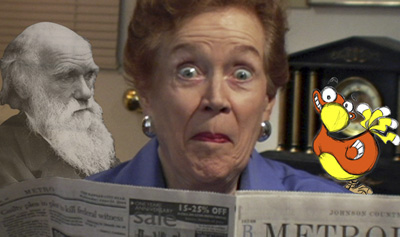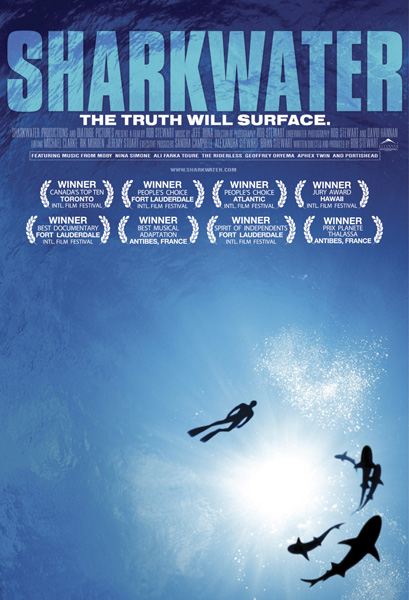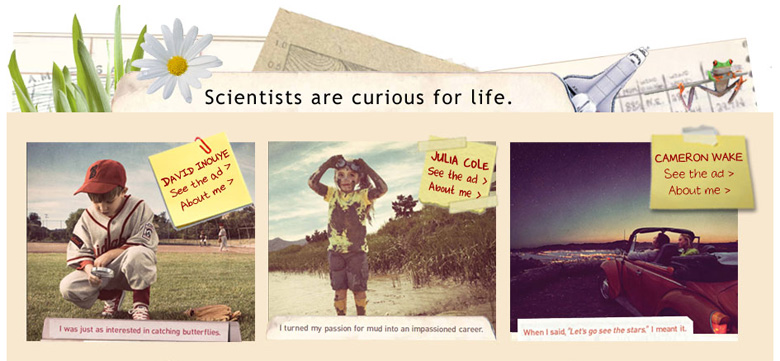#57) DISCOVERY CHANNEL, SHARK WEEK, & THE IDIOCRACY: Do they even hear Chris Palmer’s pleas?
July 29th, 2010
This video we did in 2008 is THE reason why Discovery Channel should not be propagating the fear and destruction of sharks with their annual Shark Week. What the video says is hard to even fathom — that humans have so emptied the oceans in the past 50 years, you rarely see sharks in the open seas today.
If you want a responsible, up-to-date for the 21st Century perspective on sharks, I strongly recommend you watch Sharkwater. I was deeply impressed with the job Rob Stewart did in hitting exactly the right note for how we should perceive sharks today.
#56) Last week’s CLIMATE LEGISLATION DEATH shows we have a genuine SCIENCE COMMUNICATION CRISIS
July 26th, 2010
The collapse of climate legislation last week is in part due to the ineffective mass communication of climate science. Washington D.C. is ablaze with “Monday Morning Quarterbacking” on literally this Monday morning (I’m in D.C.), but at the core of it all is a toxic mix of poor communication and failed leadership.
It’s now official — this country is in the grips of a full blown science communication crisis.

BIG BUSINESS MAKES A MOCKERY OF CLIMATE SCIENCE. Rolling Stone (the magazine that recently engaged in "assisted career suicide" with General McChrystal) has apparently decided to make itself culturally relevant again. In this month's issue they point a fickle finger at President Obama for his failure to push forward a climate agenda. This illustration comes from their article.
Last week Senator Harry Reid announced that the only major piece of climate legislation in Congress is officially dead. Rolling Stone points to the Obama Administration in doling out blame — which is particularly painful given what would have seemed like a prime opportunity to springboard something off the BP disaster.
For the science world, the official crisis is that the best scientists this nation has to offer are trying to tell the public that excess carbon emission is a serious problem that needs to be addressed. But their message is not coming through. THAT IS A SCIENCE COMMUNICATIONS CRISIS. It doesn’t get any more cut and dried.
On Friday I took part in a conference call on this subject with a team from The Nature Conservancy who will transcribe the call and eventually publish it in their monthly science publication, Science Chronicles. This week I’m in Washington D.C. to meet with folks at the Union of Concerned Scientists and Center for American Progress to talk about the mass communication of climate issues.
And in the meanwhile, we have THE ONE BIG STORY THAT IS NOT BEING TOLD: That the predictions of the Intergovernmental Panel on Climate Change (IPCC), which climate skeptics have repeatedly labeled as being, “alarmist,” are now consistently being EXCEEDED. Things are getting worse MORE RAPIDLY than expected.
You would think, given the outdoor sauna that places like Washington D.C. currently are experiencing (the misery index is through the roof here!), that EVERYONE would be talking about global warming, but as yet that’s not happening. I think there’s a lag factor at work for the present. But wait til late August if it stays like this.
UPDATE: It’s Monday morning in D.C. and the landscape is cluttered with downed trees from yesterday’s violent thunderstorms, and OpEd’s from last week’s climate collapse. Perhaps the most prominent is Paul Krugman in the NY Times who says the climate effort didn’t fail because of a lack of science or because of the weak economy. He points the finger of blame at GREED (meaning the coal and gas companies with their powerful disinformation campaign) and COWARDICE (politicians who have given up the fight, with John McCain as his biggest target, labeling him a “climate coward”).
Similarly, Lee Wasserman in the NY Times blames not just the politicians, but the Obama Administration in general. He concludes his editorial by saying, “Citizens wouldn’t support an approach they couldn’t understand to solve a problem our leaders refused to acknowledge.” He couldn’t have said it more clearly — we have a failure of both communication and leadership.
And lastly, Joe Romm of Climate Progress seems to have scored the tragi-comic quip of the day with his encapsulation of it all: “The best thing about improvements in health care is that all the climate-change deniers are now going to live long enough to see how wrong they were.”

JOIN US IN WICHITA! My 86 year old mother, Muffy Moose, co-star of “Flock of Dodos,” and I will be on hand to help celebrate the annual meeting of the Wichita chapter of Americans United for Separation of Church and State with a screening of the movie on Friday evening, September 10, at the Exploration Place in Wichita, Kansas.
#54) THE SHELF LIFE OF FILMS: A tribute to the honesty of three Maine lobster fishermen in 1991
July 19th, 2010
Nearly two decades after filming our simple, silly, and sentimental evening with three lobster fishermen from Stonington, Maine, we’re going to have a special screening of the film, September 22 at the Collins Art Center on the campus of the University of Maine, Orono. It’s not a well made film. I know. I made it. But it has something at it’s core that makes it every bit as watchable and enjoyable today as it was in 1991 when we completed it — it has the heart and soul of three lobster fishermen. And that’s all it takes to make something ageless — the human element.
#53) THE POWER OF POSITIVITY: Union of Concerned Scientists, our Kerry Campaign commercial of 2004, and the need for Total Tactics
July 15th, 2010
TOTAL TACTICS: Last Sunday the Union of Concerned Scientists launched this excellent, very positive communications campaign with ads in major newspapers. These ads aren’t meant for scientists or bloggers who read 25 articles about climate science a day. They’re meant for members of the general public who have no interest in ever looking at a graph, even if it is famous.
#52) PROFESSOR KAREL LIEM: One of my all-time heroes of science
July 12th, 2010
“TOTALLY LIEM” (5 minutes): We are so grateful we were lucky enough to shoot a fun interview with Karel Liem for “Flock of Dodos” that managed to capture a few spontaneous moments of his laughter and enthusiasm. It isn’t much, but just by watching this you can understand why his students and colleagues were so fond of him. He brought a warmth and happiness to the often-cold world of biology. What more can you ask for to draw people into the profession of science.
SPECIAL BENSHI – The Lexus/Andy Samberg Hollywood Global Warming Debate: We’re all doomed
July 9th, 2010
So I dropped two tabs of acid last night, hopped in my car, cruised around Hollywood and somehow found myself in bar packed full of drunken hipster junkies screaming at two experts squaring off on the subject of global warming with the role of moderator played by Andy Samberg of SNL. Or was it Sandy Amberg of SOL? It’s all a surreal blur now.
Yes, indeed — if you want a good lesson in climate science, then I’m sure you know that a “debate” in a bar in Hollywood hosted by a comedian is the place to get it, right? On the left, climate skeptic and jovial lunkhead, Phelim McAleer. On the right, inappropriately smart and sincere Simran Sethi. In the middle, the guy whose dick was once in a box.
#51) Guess what — sports can be boring, too
July 8th, 2010
Last week I ruffled a few readers’ feathers by saying science is boring to most people. Sorry, it is. But so is sports. Aside from the huge crowds that attend a handful of professional sports (football, baseball, basketball, soccer), most other sports don’t generate that much interest.
So in the same way that the Henrietta Lacks book proves science is boring, so does the excellent HBO show “Real Sports with Bryant Gumbel” reveal the same thing for sports. The storytellers behind the show demonstrate the same skill for using HUMAN stories to broaden interest in a narrow subject. It’s one of my favorite shows on all of television (just after “Celebrity Rehab with Dr. Drew”). Let’s take a look at what they do.
#50) CASE CLOSED: “The Immortal Life of Henrietta Lacks” proves how boring science is to the general public
July 1st, 2010
That’s right. You heard it here. And I’m wondering where else you may ever hear it. There is such a reverence towards the subject of science that virtually no one is ever likely to call it boring. I’ve got several books about communicating science sitting here on my table, and I’ve just looked through several websites on the subject. Virtually nowhere do I ever see the word “boring” even mentioned, much less in association with science. I searched an amazingly confident document titled, “A Scientist’s Survival Kit for Communicating Science,” published in 2006. The word boring only comes up twice in 70 pages of advice, and then only in reference to computer graphics and technical science meetings. It is clearly politically incorrect to refer to a subject as revered as science as being boring, yet we can see the indirect evidence of it in a masterfully written book about an aspect of medical science.
Rebeccas Skloot has written an amazing book, “The Immortal Life of Henrietta Lacks,” that communicates a big dose of science to a very broad audience (it’s been on the bestseller lists for a while now). But the skillful way in which she tells the story of the most important cell cultures in history is a perfect demonstration of using the humanities to first arouse her audience before plunging into the dry details of the science behind the story.

